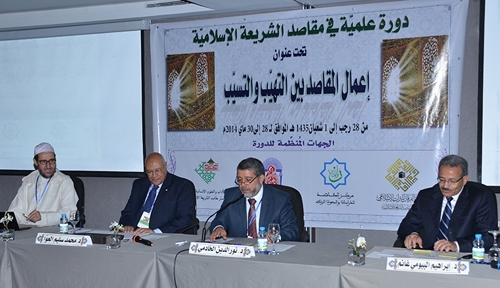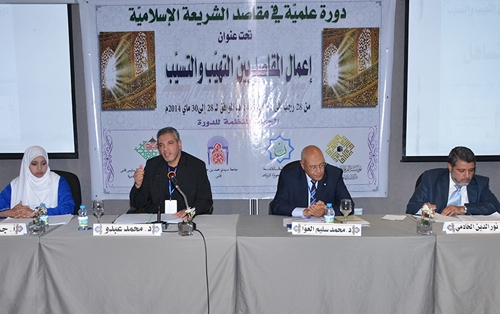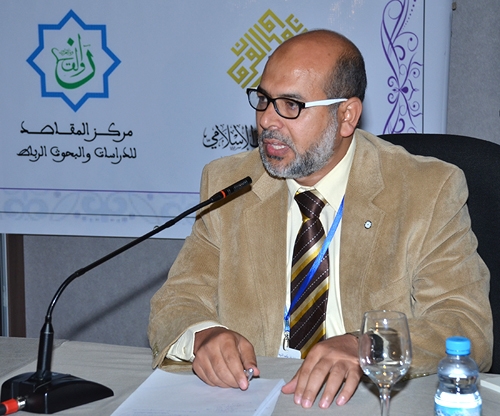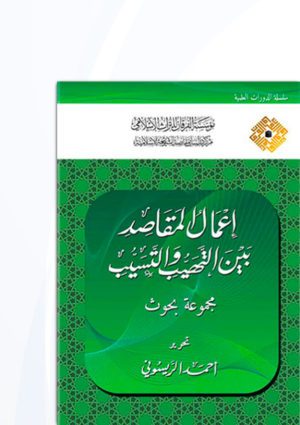
The Centre for the Study of the Philosophy of Islamic Law at Al-Furqān, in partnership with the Maqāṣid Research & Studies Centre (Rabat), Université Sidi Mohamed Ben Abdellah (Sais-Fes), the Master Course on the “Philosophy of Islamic Law (maqāṣid al-Sharīʿah) in the Maliki School of Jurisprudence (fiqh)” and the Faculty of Letters & Humanities (Sais-Fes), organised a training course under the title “Applying the philosophy of Islamic Law (maqāṣid) between fear and leniency”, from the 28th to the 30th of May 2014, in Fez, Morocco.
The participants on this closed course numbered sixty scholars and researchers, who came to Fez from Saudi Arabia, Egypt, Libya, Tunisia, Algeria, London, and Moroccan cities. The course was led by authorities in the science of maqāṣid, and attended by those seeking to enrich their knowledge, research, and learning.
Over the course of three days, 28-30 May 2014, and through six morning and evening sessions, the delegates reviewed 15 academic presentations and 28 commentaries, with discussion of all these in six public sessions, which included useful additions, commentaries, and questions.
The presentations, comments, and discussions addressed diverse aspects relating to fear and leniency in applying maqāṣid, whether in causation (taʿlīl) or application (tanzīl), starting with the latent spread in the example of the Egyptian scholar, Shaykh Muhammad Mustafa Shalabi, and his revolution in a stagnant scientific context, ending with the full establishment represented in the maqāṣid movement, which is now a potent force in Arab and Islamic universities.
The presentations also dealt with issues relating to theory, methodology, and application in the science of maqāṣid, such as ritual worship (taʿbud), causation (taʿlīl), interpretation (ta’wīl), interests (maṣāliḥ), harms (mafāsid), means of proving maqāṣid, the consequences (ma’ālāt) of maqāṣid, and examples of maqāṣid teaching, past and present. In addition, it dealt with contrasting the boldness and reluctance of users of maqāṣid, as well as the assault on, and emptying of its substance by the Modernists.
The keynote event witnessed in this seminar was the application and use of the jurisprudence of maqāṣid in the political and constitutional fields at the heart of an Arab popular movement that turned the page on tyranny and enslavement, and opened a fresh one celebrating freedom and emancipation; indeed, Tunisia played a pioneering role in the revolution, and also, in applying maqāṣid to, and in the revolution.
Course Proceedings
In addition to opening and closing sessions, the scientific sessions were as follows:
On the first day, Wednesday 28 May, the First Scientific Session was chaired by Dr Noureddine El Khademi, former Minister of Religious Affairs, and lecturer at the University of Zaytuna, where Dr Mohamed Salim El-Awa (Islamic scholar, lawyer, and international consultant in law, Egypt) gave a presentation titled “Causation (taʿlīl) by citing wisdom (ḥikmah): its allowance, and incidence in Islamic Law (Sharīʿah) and Jurisprudence (fiqh) – the work of eminent scholar Muhammad Mustafa Shalabi as an example”. This was commented upon by both Dr Mohammed Boulaouz (Centre for the Education and Formation Professions, Rabat, Morocco), and Dr Ibrahim Bayoumi Ghanem (Adviser, National Centre for Social and Criminal Research, Egypt).

The second presentation was given by Dr Abdel Nour Bazza (Meknes Academy, Morocco) on “Causation (taʿlīl) and Benefit (maṣlaḥah) in the Dhahiri school –Ibn Hazm as an example”. This was commented upon by Dr Driss Charki (Faculty of Letters and Humanities, Sais-Fes, Morocco), and Dr Abdul-Majeed al-Najjar (Executive Member of the International Union of Muslim Scholars). Subsequently, the floor was opened to general discussion and responses.
In the evening, the Second Session was chaired by Dr Mohamed Salim el-Awa, where Dr Mohamed Abdu (researcher in maqāṣid) gave a presentation titled “Causation (taʿlīl) in Islamic law between lack of discipline and laxity”. This was commented upon by both Dr Noureddine El Khademi, and the researcher, Jamila Tilout (Doctoral researcher at the Faculty of Letters, Sais-Fes, Morocco). Dr Yusuf Hmito (lecturer and researcher in maqāṣid al-Sharīʿah) gave a presentation titled “Maqāṣid between undisciplined application and phobia of utilisation”. This was commented upon by both Dr Ahmad al-Kafi (Centre for the Education and Formation Professions, Casablanca, Morocco), and Mr Mohamed Tonio (researcher in maqāṣid at the Doctoral Research Institute, Faculty of Letters, Sais-Fes).

Dr Wasfi Ashur (researcher specialising in maqāṣid) gave a presentation on “Islamic law rulings between ritual worship (taʿbud) and causation (taʿlīl)”, which was commented upon by both Dr Abdul Rahman al-Adrawi (Faculty of Letters and Humanities, Beni-Melal, Morocco), and Dr Abdul Majeed Muhib, instructor at Dar al-Ḥadīth al-Hasaniyah Foundation, Rabat, after which the opportunity was given for general discussion and responses.
On the second day, Thursday 29 May, the third Scientific Session was chaired by Mr Sali Shahsivari, Managing Director of Al-Furqān, where Dr Abdussalam Ait-Saeed (researcher in maqāṣid) gave a presentation titled “The maqāṣid approach and its effect in determining benefits (maṣlaḥah) and harms (mafāsid)”, which was commented upon by Dr Amrani Alawi Abasidi (Faculty of Letters and Humanities, Meknes), and Dr Mohamed bin Ahmad bin Sayid Awbek (Head of the Fiqh and Uṣūl Department at the Islamic Sciences University, Mauritania).
Dr Abdul Rahman Al-Adrawi (Faculty of Letters and Humanities, Beni-Melal, Morocco) gave a presentation titled “Maqāṣid and interpretation (ta’wīl): a study in the scientific, logical foundation of maqāṣid knowledge”, which was commented upon by both Dr Bushra al-Alam (Faculty of Letters and Humanities, Rabat, Morocco), and Mr Salim Shaykhi (researcher in maqāṣid al-Sharīʿah, Libya).
Then it was the turn of Dr Noureddine El Khademi, to give a presentation on “Maqāṣid in the political and constitutional sphere: Tunisia as an example”, which was commented upon by Dr Sidi Muhammad Zuhayr (Faculty of Letters and Humanities, Sais-Fes), and Dr Mawlay Umar bin Hammad (Faculty of Letters and Humanities, Rabat, Morocco). Subsequently, the floor was opened for general discussion and responses regarding the two presentations and the commentaries upon them.
In the evening of the second day, the Fourth Scientific Session was chaired by Dr Mulay Umar bin Hammad, where Dr Farid Chokri (Muhammadi Faculty of Letters and Humanities, Morocco) gave a presentation on “Methods of proof in the maqāṣid al-Sharīʿah: means (asbāb) and causes (musabbibāt) as example”, which was commented upon by Dr Ahmed al-Raissouni (Director of the Maqāṣid Research and Studies Centre, Rabat), and Mr Wanis al-Mabruk (researcher in maqāṣid al-Sharīʿah, Libya).
Dr Abdul-Majeed al-Najjar (Executive Member of the International Union of Muslim Scholars) then gave a presentation on “Means of establishing consequences (ma’ālāt) of maqāṣid in relation to lack of courage in application (tanzīl)”, which was commented upon by Dr Omar Jadia (Faculty of Letters and Humanities, Sais-Fes, Morocco), and the researcher, Abdul Ghani Yahyawi (Doctoral Research Institute, Faculty of Letters and Humanities, Sais-Fes).
This was followed by a presentation by Dr Ibrahim Bayoumi Ghanim (Adviser, National Centre for Social and Criminal Research, Egypt) on “The purpose of protecting life in the fiqh of water: an exercise in criticism of explanatory examples and their renewal in maqāṣid teaching”, which was commented upon by Dr Muhammad al-Ansari (Faculty of Letters and Humanities, Meknes, Morocco), and the researcher, Lahsen al-Rahali (researcher at the Doctoral Research Institute, Faculty of Letters and Humanities, Sais-Fes). Subsequently, the opportunity was given for a general discussion and responses relating to the three presentations and the related commentaries.
On the third and final day of the course, Friday 30 May, the Fifth Scientific Session was chaired by Dr Sidi Mohamed Zouhir, where Dr Mihmad Rafi (lecturer at the Faculty of Letters and Humanities, Dahr-Mihzar, Fez), presented “Maqāṣid-based reasoning in determining the matter of implementation of Islamic law in contemporary societies”. This was commented upon by Dr Idriss Awhana (Faculty of Letters and Humanities, Meknes), and Dr al-Hasanal-Mousse (Moroccan researcher in legal theory and philosophy of Islamic law).
Then Dr Saeed Halim (Head of the Islamic Studies Department at the Higher Teacher’s School in Fez) gave a presentation on “Maqāṣid in the political and constitutional sphere”, which was commented upon by Dr Mohamed Awwam (Moroccan researcher in maqāṣid), and Dr Ahmad Izzeawi (Centre for the Education and Formation Professions, Fez, Morocco), followed by general discussion and responses.
In the evening, the Sixth Scientific Session was chaired by Dr Omar Jadia, Pedagogy co-ordinator for the Masters in “Maqāṣid in the Maliki School of Jurisprudence of the Islamic West between theory and application” at the Faculty of Letters and Humanities, Sais-Fes, Morocco. Dr Wael al-Harithi (Lecturer in the Faculty of Sharīʿah, Um al-Qura University, Makkah) gave a presentation on “The modernist approach to maqāṣid theory: a methodological review”. This was commented upon by Dr al-Hasan Hamdouchi (Faculty of Letters and Humanities, Dahr-al-Mehraz, Morocco), and Dr Abd al-Kabir Hamidi (the Multidisciplinary Faculty, al-Rashidiyah, Morocco). The highlight, preceding the end of the course, was the lecture by Dr Ahmed al-Raissouni titled “The science of maqāṣid from latent to establishment”, after which the floor was opened to general discussion and responses regarding the presentation and lecture.
Conclusions & recommendationsIn light of the presentations, commentaries, and discussions that enlivened the course and revealed the importance and need for the topic, while adding further detail, a set of recommendations relating to the organisational, scientific, and methodological aspects was presented as follows:
- It was strongly argued that this course must become a fixed annual event; alternatively, holding it in other Moroccan cities, while ensuring robust organisation.
- Promoting and publishing the course proceedings through available media channels, and as a printed book for wider benefit and to disseminate knowledge.
- Establishing a specialist journal on maqāṣid under the editorial supervision of a panel of experts.
- Establishing a scientific body bringing together those interested in maqāṣid, and unifying their knowledge and effort.
- Organising a seminar focused solely on the eminent scholar, Muhammad Mustafa Shalabi, and his innovative work leading to renewal.
- Establishing a workshop for eminent authorities working on maqāṣid in the Islamic world, that addresses the contemporary issues of the Muslim nation, through the science of maqāṣid.
- The maqāṣid indicator project applied to states, governments, and policy, to determine how far it is respected and adhered to.
- Publishing periodic reports on the state of maqāṣid, monitoring what occurs in reality, and reporting that to actors and decision-makers.
- Identifying the key areas and disciplines that require the added input of maqāṣid to their content, clarifying their influence on maqāṣid and the various disciplines, and holding special seminars on the matter.
- Greater attention to political and pragmatic models to which maqāṣid has been applied, and their consequences (ma’ālāt), as well as other models in which maqāṣid and consequences (ma’ālāt) have been ignored.
- The topic of proof of maqāṣid has new dimensions, and deserves dedicated courses and publications, to which researchers and academics should be directed.
- The entry of new, hitherto unaddressed, issues that witnessed a vacuum with respect to maqāṣid, such as employment and labour contracts...
- Inviting the key emerging figures in maqāṣid to scientific colloquia, in order to achieve a participatory approach.
- Organising a training course on the maqāṣid concepts and terminology, to unify the conceptualisation of maqāṣid, and publish a glossary of maqāṣid terms.
- Invitation to respond to questions that would be the key for courses, publications, or research, such as: what is the benefit of causation (taʿlīl) of the ruling on the responsible individual, and in Sharīʿah generally? Was the intent of the Legislator to keep the effective causes (‘illal) hidden, or not?
- Holding a course or courses on the issue of applying Islamic (Sharīʿah) law, and establishing a reviewed scientific plan around this, and publishing it as a book.
- Holding a seminar or conference, addressing the evaluation of contemporary experiments in a number of Islamic states of applying Islamic (Sharīʿah) law, such as Saudi Arabia, Sudan, Iran, Kuwait, Malaysia, Pakistan, Afghanistan, Brunei.
- Directing students and researchers at Masters and Doctoral levels to prepare scientific researches in the areas of Islamic law-based governance (al-siyāsah al-shar‘īyyah), and its relationship to maqāṣid.
- Directing researchers to add depth to work on the topic “personal intent, and customary intent, and their effect on contemporary developments”.
- Demanding that Islamic Studies departments, and Sharīʿah faculties offer the topic of Islamic law-based governance (al-siyāsah al-shar‘īyyah).
- Arranging a course on maqāṣid at the organisation, to bring together scholars of Islamic law and secular law, on the maqāṣid platform.
- Paying attention to those complex issues, where mature opinion has not fully emerged; collating and presenting these to maqāṣid scholars to address and treat according to the rules of maqāṣid-based reasoning.


